AG Steve Marshall announces Jackie Hornsby to serve as office’s Law Enforcement Coordinator after retirement of Tommie Reese
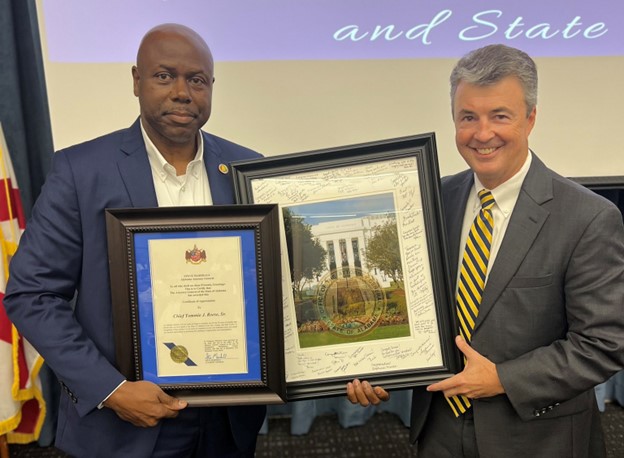
On Monday, Attorney General Steve Marshall announced that long-time law enforcement professional Jackie Hornsby has been appointed as the new Law Enforcement Coordinator for the Alabama Attorney General’s Office. Hornsby will take over the role from Chief Tommie Reese, who will be retiring at the end of the month. Reese has served in the position since January 2019. “Special Agent Hornsby has proven himself to be a knowledgeable and dedicated law enforcement officer over his more than 26 years of service. Jackie’s wealth of knowledge will be a tremendous asset to our office and will contribute immensely to our relationships with other law enforcement agencies,” Marshall said in a press release. “With his understanding of our office’s resources and expertise, Special Agent Hornsby will be a great asset for local and state law enforcement who are facing a variety of new challenges in their communities.” Hornsby will work with law enforcement agencies across the state to develop training programs, notify officers of changes in criminal law, and facilitate communication and cooperation between the Attorney General’s Office and law enforcement statewide. “I have worked closely with General Marshall for many years, and I know and respect his genuine support for law enforcement,” said Special Agent Hornsby. “I am truly honored by the opportunity to continue serving the citizens of Alabama and the men and women of law enforcement as his Law Enforcement Coordinator.” Hornsby is a Pike County native who graduated from Troy University with a Bachelor of Science in Criminal Justice. He began his law enforcement career in 1997 with the Alabama Department of Public Safety as an Alabama State Trooper. After the creation of the Alabama Law Enforcement Agency (ALEA), Hornsby became a Special Agent Senior with the State Bureau of Investigation and later transferred to the Dignitary Protection Unit of ALEA. He has served on the security details of then Lt. Gov. Kay Ivey and Attorney General Luther Strange. Hornsby served on Attorney General Marshall’s security detail since he came into office in 2017 and became Detail Leader in 2019. Marshall commended Reese on his service. “Alabama is a safer state because of the relationships Chief Reese has forged in his 38 years of public service. Thank you, Chief, for your dedication to our men and women in blue. We wish you all the best in retirement,” Marshall said. Thank you, Chief Tommie Reese for your 38 years of service to our great state. It has been an honor and a privilege to have you serve as our law enforcement coordinator for the past five years. You will be missed dearly! pic.twitter.com/4qt6Evwdan — Attorney General Steve Marshall (@AGSteveMarshall) September 25, 2023
DA drops charges against Perry Hooper
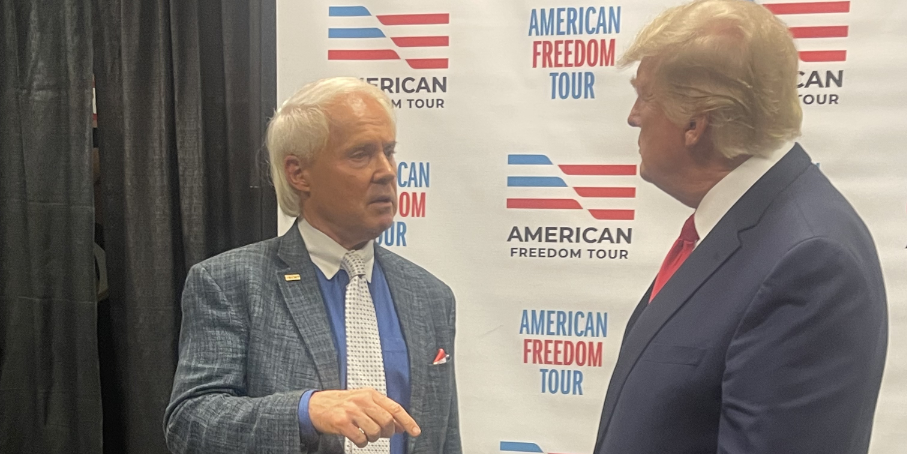
On Monday, the Montgomery District Attorney dropped the sex abuse charge against former State Representative Perry Hooper Jr. after his accuser asked that the charges be dropped. “The State of Alabama has concluded that without the victim’s testimony and cooperation, the evidence would be insufficient to attain a conviction,” Chief Deputy District Attorney Azzie Taylor wrote in a motion filed in Montgomery County Circuit court on Monday morning. Hooper, age 68, was indicted on sex abuse charges by a Montgomery County grand jury last month. Hooper was arrested in August after an incident at a downtown Montgomery restaurant on Commerce Street. The alleged victim, Elizabeth Daly, wrote in a statement released to Alabama Today, “I have asked that any charges against Perry Hooper be dismissed. The matters relating to Mr. Hooper and me have been resolved, and going through the turmoil of a trial would provide no more justice than getting a sincere public apology from Mr. Hooper. I so respect and appreciate law enforcement and the job they have to perform. Nevertheless, I request these charges be dismissed.” Daly has asked that the press respect her privacy and not contact her. When asked for comment, Hooper told Alabama Today to refer all questions to his attorney. Hooper is a member of the Alabama Republican Party Executive Committee representing Montgomery County and a member of the Board of the Alabama Music Hall of Fame. Hooper was a frequently published political commentator whose columns were frequently published at 1819 News and the Montgomery Advertiser. According to an affidavit, Hooper approached a woman (Daly) working at a restaurant from behind and allegedly grabbed her breasts and waist in an unsolicited embrace while shoving his pelvis against the victim’s backside and began kissing her neck before she was able to break free. Hooper’s next court date was scheduled for December 21 with Circuit Judge J.R. Gaines. Hooper is represented by veteran Montgomery defense attorney Joe Espy. Hooper served in the Alabama House of Representatives from 1983 to 2002. Hooper was an early backer of Donald Trump in the 2016 Republican primary season and chaired the Trump Victory Fund in the 2016 campaign. Hooper was a frequent visitor to the Trump Whitehouse and Trump’s Mar-A-Lago Resort. Hooper’s father, Perry Hooper Sr. – now deceased, was the first Republican Chief Justice of the Alabama Supreme Court since Reconstruction. Hooper is married and has three sons and a number of grandchildren. Hooper Jr. was one of six finalists that then-Gov. Robert Bentley considered for appointment to the U.S. Senate in 2017. That appointment instead went to Luther Strange. Hooper endorsed Strange rather than running in the Republican primary. Former Chief Justice Roy Moore defeated Sen. Strange in the primary but lost to Clinton-era U.S. Attorney Doug Jones in the special election. An indictment is merely the finding by a grand jury that the prosecution has presented enough evidence for a jury trial to take place. An indictment is simply a formal accusation. Under the American justice system, all persons are presumed innocent unless found guilty by a jury of their peers. To connect with the author of this story, or to comment, email brandonmreporter@gmail.com.
Paul DeMarco: Unpredictable U.S. Senate races in Alabama now the new normal

So the party primaries are over in Alabama and Katie Britt is now the Republican nominee for the United States Senate. We could say this race was one for the history books, but candidly so have the last three U.S. Senate elections in Alabama. It used to be that Senate contest came along rarely in Alabama, but the past five years have proven otherwise. First, there was the 2017 special election with the Republican Primary between then-Attorney General Luther Strange that ended with former Alabama Supreme Court Justice Roy Moore prevailing. The general election that year had the eyes of the Nation watch Moore then go on to lose to Democrat Doug Jones. The 2020 election then came when former Auburn Football Coach bested former Senator Jeff Sessions for the Republican nomination. Coach Tuberville ousted then-Senator Doug Jones from his seat to return the seat to Republican hands. There have been tens of millions spent on races to represent Alabama in the United States Senate in the past five years, and this current election is still not over. However, count on Republican Katie Britt winning in the fall and being the next United States Senator to represent Alabama. We cannot predict the next Senate race in Alabama, but based on recent history it will be another roller coaster ride for both candidates and state voters. Paul DeMarco is a former member of the Alabama House of Representatives and can be followed on Twitter @Paul_DeMarco.
Mountain Brook resident Jessica Garrison named one of ‘Washington’s most powerful women’

Mountain Brook, Alabama, seems a long way from Washington, D.C., but one resident is making her name known in the tech world. Jessica Medeiros Garrison was recently listed on the “Washingtonian” magazine’s list of “Washington’s Most Powerful Women,” Village Living reported. Garrison works as vice president of government affairs for Clearview AI, a facial recognition tech company. She was recognized under the category of lobbying and advocacy for her role in helping to sell Clearview AI’s technology. Clearview AI is based out of New York City. The company has a database of more than 10 billion images taken from social media, websites, news articles, criminal databases, and other public sources. The company uses its search engine technology to help law enforcement and government agencies identify suspects, solve crimes and provide justice to victims. Clearview AI was named to Time magazine’s inaugural list of the “100 Most Influential Companies” in 2021. “We are now recognized as the most accurate algorithm in the Western world,” Garrison said. “There are trillions of publicly available images on the Internet, which provide a tremendous capability for identifying investigative leads and clues to solve crimes and save victims,” she said. “This resonates with me on such a deep level — that this broad and wide-sweeping technology can actually provide a path to setting wrongs right.” When asked about being named one of Washington’s most powerful women, Garrison stated, “I was completely surprised when a friend forwarded me a photo of the announcement article,” she said. “I am humbled, and a bit overwhelmed.” “The fact that my work and my calling are making a difference fuels me to work even harder,” she said. “When you are fortunate enough to be in a position to effect change, you assume a certain measure of responsibility,” she said. “I take my opportunities to influence opinions and to help shape outcomes seriously, envisioning the outcome for the people who will be most impacted.” After graduating from the University of Alabama in 1997, Garrison served as director of legislative affairs and public information in the office of Bill Pryor while he was Alabama Attorney General. She graduated from the University of Alabama School of Law in 2000. Garrison also served as executive director of the Republican Attorneys General Association and managed Luther Strange’s 2010 campaign for Alabama Attorney General. Although originally born in Rhode Island, Garrison loves Mountain Brook. “I feel like Mountain Brook is home, and I love it,” Garrison said. “Mountain Brook is all about the people. Not only are they kind and caring, but also these are people who achieve in the world. They’re in medicine and business, in law and entrepreneurship. They constantly inspire me as leaders and visionaries who aim to make the world a better place.”
Inside the Statehouse: U.S. Senate runoff moved to July

Steve Flowers gives an overview of the newly rescheduled US Senate race.
John Merrill announces 92 percent of Alabama election complaints closed
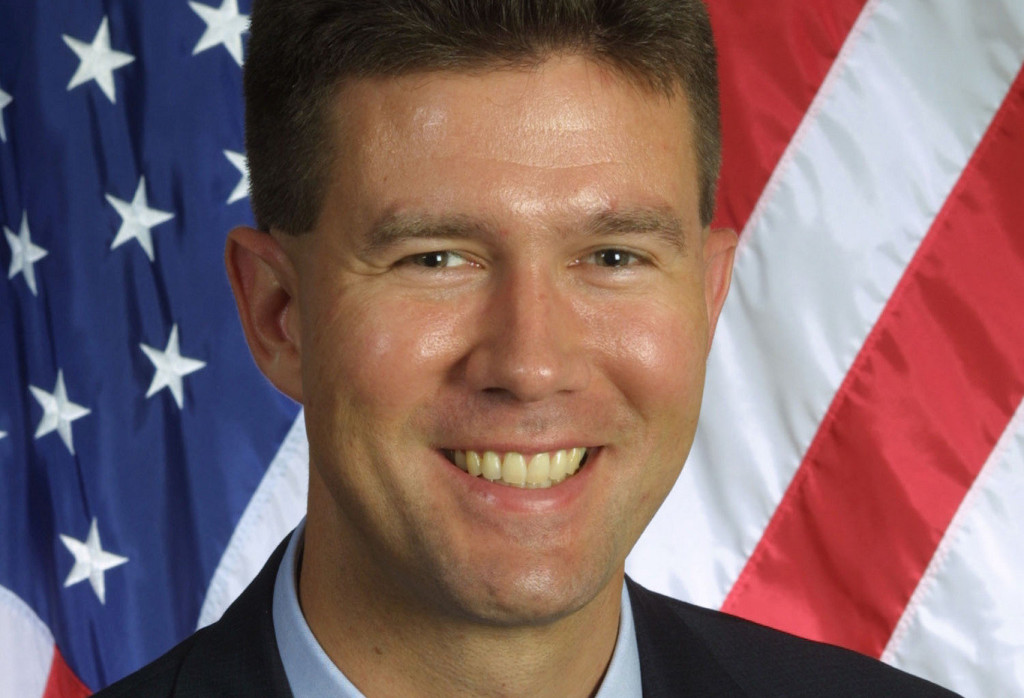
Alabama Secretary of State John Merrill announced on Tuesday that his office has successfully resolved all election complaints from the 2016 election cycle and the 2017 Senate election. Since taking office, Merrill’s team has closed over 92 percent of election issues and complaints that have been submitted. “Our goal since taking office has been to make it easy to vote and hard to cheat,” Merrill said in a press release. “When I first sought this office, there was no process for documenting voter fraud reports. It is unfortunate complaints like this have to be made at all, but I am proud of the way we have worked to follow through and get them closed or reported to the appropriate authorities.” In March of 2015, former Alabama Attorney General Luther Strange and the Alabama Law Enforcement Agency partnered with the Secretary of State’s office to form the Alabama Elections Fairness Project; a united effort to “investigate and prosecute allegations of voter fraud or campaign finance irregularities,” according to AL.com. The team has since created a page on the Secretary of State’s website where concerned individuals can report suspected fraud or suspected violations of the Alabama Fair Campaign Practices Act in state and local elections online. Since April of 2015, Merrill’s office has received 764 complaints about voting issues from several sources, including personally observed voting fraud. Of the 764 complaints received, the office has only 58 remaining cases under investigation. The following is a breakdown of which organizations closed the 706 complaints which were resolved: Seven closed reports were handled by Merrill’s office 24 were sent to the ethics commission 37 were reported to the Attorney General 151 were closed due to lack of sufficient information 39 were reported to local or state law enforcement two were withdrawn 446 were closed generally Each member of the Alabama Elections Fairness Project received complaints in accordance with their jurisdiction. For example: complaints sent to the Ethics Commission involved campaign material or finance issues and those sent to the Attorney General’s office were sent because the complaint contained “improper procedures in the administration of the election process, absentee balloting issues or misuse of campaign materials,” according to the press release. “Our office is committed to serving the citizens of Alabama and to doing our part to uphold the rule of law,” Merrill continued in the press release. “We work closely with our law enforcement agencies at the local, state and federal levels to ensure these issues are properly investigated and vigorously prosecuted. We currently have several cases under investigation that could lead to criminal charges, and we hope that serves as a deterrent for people who would seek to harm our electoral process in the future.”
Kay Ivey mandates no more food funds in sheriff’s pockets

After several reports this year of Alabama sheriff’s stealing and pocketing hundreds of thousands of dollars meant for inmates food rations, Governor Kay Ivey has said, “no more.” On Tuesday, Ivey issued a memo to the state comptroller rescinding the Yellowhammer State’s policy of “paying prisoner food service allowances directly to sheriffs in their personal capacities.” Funds must now instead go straight to government accounts. “For decades, sheriffs have made extra money – sometimes hundreds of thousands of dollars – under a Depression-era system by feeding prisoners for only pennies per meal,” the Associated Press reported. The previous guidelines allowed sheriffs to use $1.75 a day to feed each prisoner, then pocket anything that was left over. This practice led to Monroe County Sheriff Tom Tate to pocket $110,458 over the course of three years; and Etowah County Sheriff Todd Entrekin to collect $672,392 in 2015 and 2016. Ivey’s legal team used 2011 ruling made by former Attorney General Luther Strange to back-up the new mandate. “Based on the facts presented, neither the sheriff nor the county may use the surplus for any purpose other than future expenses in feeding prisoners,” Strange had said. The problematic precedent was previously set in 2008 when then-Attorney General Troy King ruled “the sheriff may retain any surplus from the food service allowance as personal income,” in a letter to Etowah County Commission Attorney James Turnbach. Alabama has one of the highest incarceration rates in the world with 946 people imprisoned per 100,000 people in the state in prison or jail. The state’s prison system has also faced some legal trouble. In 2014, the Southern Poverty Law Center (SPLC) and the Alabama Disabilities Advocacy Program filed a lawsuit against the Alabama Department of Corrections (ADOC) to end the poor conditions in the state prison system, including the understaffing of both correctional and mental health workers.
What to expect in the Supreme Court confirmation battle
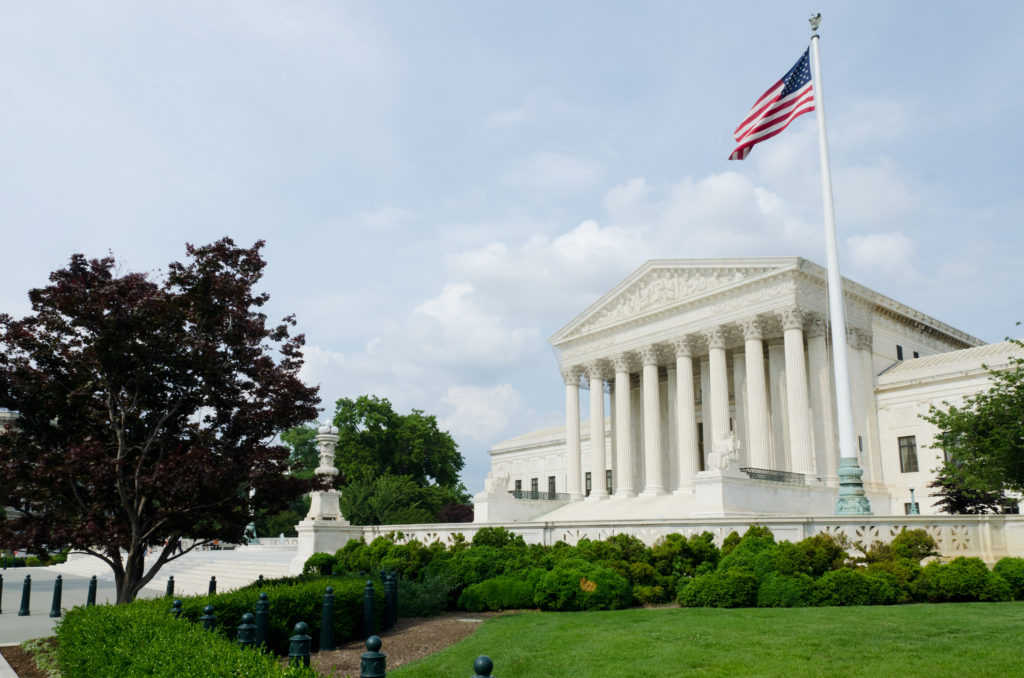
The coming battle over a Supreme Court nominee promises to be a bruising one. Republicans are eager for conservatives to gain a firm majority on the court. Democrats are voicing alarm about what the new justice could mean for charged issues such as abortion rights and gay rights. The stakes are enormous, and advocacy groups that don’t have to unveil their donors are spending heavily to shape the fight. President Donald Trump’s top contenders for the vacancy appear to be federal appeals judges Amy Coney Barrett, Thomas Hardiman, Brett Kavanaugh and Raymond Kethledge. Trump planned to announce his pick Monday night. Regardless of his choice, it’s likely that the closely divided Senate will be holding a momentous confirmation vote just weeks before the midterm election. A look at what to expect: Finding The Votes Republicans may have a narrower margin for error than they did when the Senate confirmed Trump’s first Supreme Court nominee, Neil Gorsuch, by a vote of 54-45 in April 2017. Democratic Sen. Doug Jones of Alabama has replaced Republican Sen. Luther Strange, cutting the GOP’s Senate majority to 51-49. Meanwhile, Republican Sen. John McCain of Arizona is battling brain cancer and has not been back to the Capitol since December. That increases the focus on two Republicans — Sen. Susan Collins of Maine and Lisa Murkowski of Alaska. Both support a woman’s right to have an abortion and will be looking for assurances that the nominee would not overturn the Roe v Wade decision establishing abortion rights. Trump pledged in 2016 that he would be “putting pro-life justices on the court.” On the Democratic side, the focus will be on Sens. Heidi Heitkamp of North Dakota, Joe Donnelly of Indiana and Joe Manchin of West Virginia. All three voted to confirm Gorsuch and are up for re-election in states that Trump won handily. Whatever they decide will upset a large group of voters in their home states. If Collins and Murkowski vote “no” and Democrats all vote “no,” the nomination would be blocked. If McCain were to miss the vote, only one GOP defection would be needed to block the nomination if all Democrats were opposed. Old Wounds Democrats are still stinging from Republicans refusing to even grant a hearing to President Barack Obama’s choice to serve on the Supreme Court, Merrick Garland. They are calling on Senate Majority Leader Mitch McConnell, R-Ky., to wait until after the November election to schedule a hearing and vote. McConnell has rejected that possibility, saying the decision to not fill the vacancy under Obama was prefaced on it being a presidential election year. Democrats say McConnell is being hypocritical in moving forward with the nomination. While that argument won’t sway Republicans, their strategy could stiffen Democratic resolve to oppose the nominee. Liberal advocacy groups are challenging Minority Leader Chuck Schumer, D-N.Y., to keep the Democrats united. Senate Relations Much of the groundwork for a successful confirmation comes in private meetings that the nominee will have with individual senators in the coming weeks. For lawmakers who are not on the Judiciary Committee, it may be their only chance to talk with the nominee personally before a final vote. Gorsuch met with nearly three-quarters of the Senate in advance of his hearings. The process is arduous, with the private meetings giving way to days of testimony before the Senate Judiciary Committee, which has 11 Republicans and 10 Democrats. Hearings for the most recent nominees to the Supreme Court have lasted four or five days, though there were 11 days of hearings for Robert Bork’s nomination in 1987. On average, for Supreme Court nominees who have received hearings, the hearing occurred 39 days after the nomination was formally submitted, according to the Congressional Research Service. The Judiciary Committee need not approve the nomination for it to advance. A negative recommendation or no recommendation merely alerts the Senate that a substantial number of committee members have reservations. The Fight Outside The Capitol Before the president has even made his announcement, advocacy groups are making clear they will play an important role in the coming fight. Groups that support abortion rights are planning a “Day of Action” for August 26, the anniversary of the 1920 adoption of the 19th Amendment giving women the right to vote. The liberal advocacy group Demand Justice will spend $5 million on ads through September and began airing spots Thursday in Maine and Alaska aimed at pressuring Collins and Murkowski. “Why won’t she rule out voting for Trump’s anti-choice picks?” both ads ask. It also plans to run ads next week in Manchin’s, Donnelly’s and Heitkamp’s home states with a softer tone, asking them to continue protecting people with pre-existing health conditions by opposing a nominee who’d threaten that. Meanwhile, the conservative Judicial Crisis Network is targeting vulnerable Democratic incumbents in its ad campaigns. The deep-pocketed group advertised against Senate confirmation of Garland and spent millions more advocating for Gorsuch. Republished with the permission of the Associated Press.
Meet Christy Edwards, your presumptive, new Court of Civil Appeals, Place 1 Judge
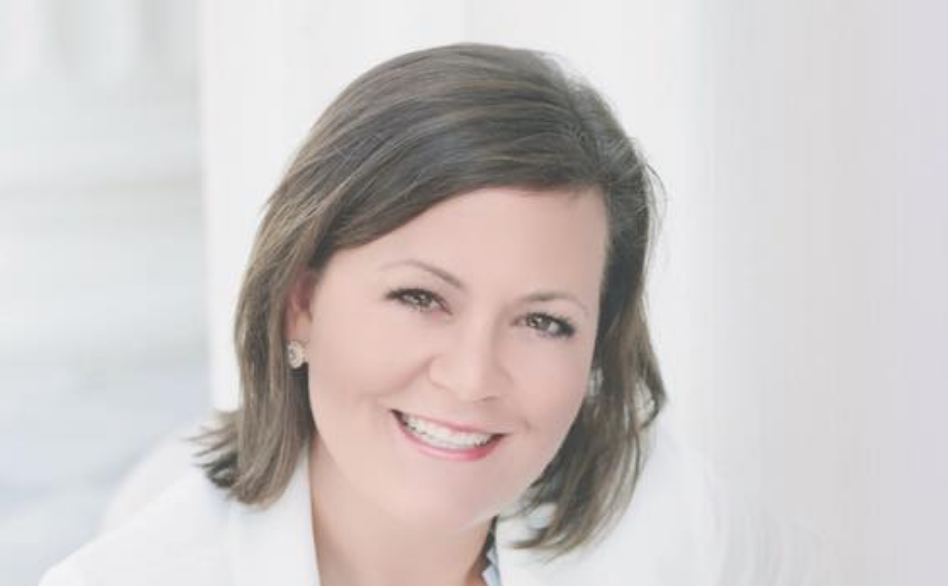
In the race for Alabama Court of Civil Appeals Place 1, three candidates stepped up to the plate seeking election in the June 5 primary. Judge Christy Edwards and Judge Michelle Thomason both garnered enough support to tip the race into a runoff election in which Edwards took home 54 percent of the vote. Now, facing no Democratic challenger in the November general election, Edwards has presumably won her race and will become Court of Civil Appeals Place 1 Judge in 2019. With that in mind, here are the five things you need to know about Christy Edwards: 1. She’s a judge on the Alabama Tax Court. In 2016 Edwards was appointed to the Alabama Tax Tribunal where she currently serves as a Judge. According to her campaign website, she wants to bring her knowledge of tax laws to bear on the appeals process. “Everyone has to pay taxes – businesses, business owners, consumers and regular people,” Edwards said. “The businesses and the people of this state need a judge who will oversee the tax laws and protect the taxpayers according to all the laws overseen by this court. I will do that.” 2. She’s an award-winning writer and orator. In law school Edwards was the Regional Champion of the American Bar Association’s appellate advocacy competition, Regional Champion and national quarter finalist of the National Best Brief competition, and was named Jones Law School Best Oral Advocate. Her most recent articles have been published in the Journal of Multi-State Taxation and Incentives. 3. She was endorsed by primary opponent Pat Thetford. Primary opponent Pat Thetford endorsed Edwards, saying he believed she is the best candidate for the job and urged his supporters to vote for her in the runoff election. 4. She has two degrees from Alabama. After completing a bachelor’s degree in Finance and Economics from the University of Alabama, Edwards earned her Juris Doctorate from Faulkner University Jones School of Law and an LL.M. from the University of Alabama School of Law with a focus on complex state tax laws. 5. She previously served as an Assistant Attorney General. Edwards practiced family and commercial and civil litigation in her own private practice for 2 years after law school. She then was appointed to serve as an attorney for the court of civil appeals before becoming an Assistant Attorney General under then Attorney General Luther Strange in 2011. There, she represented the state in state and local tax disputes in the Alabama Department of Revenue.
Five things you need to know about Troy King

The primary elections are over, but some highly sought spots still remain open due to the primary races resulting in runoffs. One of those races is for the Attorney General’s seat. In a highly contested and publicized race, Incumbent Steve Marshall and former Alabama Attorney General Troy King both garnered enough support to tip the race into a a runoff election set for July 17. With that in mind, here are five things you need to know about Troy King: 1. He was Alabama’s Attorney General in from 2004 to 2010. It’s safe to say King knows a thing or two about the day-to-day proceedings of the Alabama Attorney General’s office. He was first appointed attorney general in 2004 by former Gov. Bob Riley, after William Pryor left the office to accept federal judge position with the Eleventh Circuit Court of Appeals. In 2006, King defeated democratic nominee John M. Tyson in the November general election of that year. He served as Attorney General for one term after his election, and was defeated by Luther Strange in the 2010 Republican primary; but now he’s back and ready to ultimately find victory as the Party’s nominee. 2. He was instrumental in bringing changes to the Yellowhammer State’s sex offender laws. While serving as Attorney General, King made it his mission to bring new laws regarding sex offenders to the state. Specifically he wanted the state to require that Alabama’s sex offenders who were released wear an electronic monitoring bracelet (such as those used for those on house arrest or parole) to monitor the sex offenders whereabouts. He was so adamant about his position that he wore an electronic monitoring bracelet himself during the 2005 legislative session, until the law was changed. 3. Although he is very opposed to gambling of any kind in Alabama, he’s accepted campaign donations from out of state gambling interests. During his time as Attorney General, not only did he introduce anti-gambling legislation every year of his time in public office, he also prosecuted several electronic gambling sites, opposed a gambling expansion for the Native American tribes in Alabama, and even requested that the United States Department of the Interior deny the Poarch Band of Creek Indian’s application to broaden their gambling operations in the state. But a recent report by AL.com claims King has received “about $90,000 from five South Carolina companies and individuals with links to gaming.” According to the report, one of the major donors from South Carolina, Keith Gray, is involved in the gambling business, with one of his businesses being prosecuted in 2017 by the state of Alabama. Gray reportedly used his own name, names of family members, and business associates to donate to King’s campaign, including two companies called Open Ocean Investments and Sycamore Investments. Which have, “disconnected phone numbers, [and] share a post office box in Piedmont, South Carolina.” 4. He was the first Attorney General to sue BP after Deepwater horizon. On April 20, 2010, an explosion on an oil rig off the coast of Luisiana, called Deep Water Horizon, started a chain of events which eventually led to around 4.9 million barrels of oil being pumped into the Gulf of Mexico. The spill caused massive amounts of damage to coastal ecosystems and communities located near the gulf. Under King’s leadership, Alabama was the first state impacted by the Deep water Horizon oil spill to file a lawsuit against the oil rig’s owners, BP. “BP is now on notice,” King told CNN. “Alabama intends to hold you good to your word and to make you put our state back the way you found it.” King’s actions led to a settlement with BP in which the state was awarded $1.3 billion to be paid out over 14 years. 5. His favorite musician is Johnny Cash (at least on Facebook anyway). According to King’s campaign Facebook page, his favorite music to listen to is Johnny Cash. Cash is a very famous country artist best known for his songs “Boy Named Sue” and “Ring of Fire.”
Who’s who in statewide and congressional races on the primary ballot

Alabama’s primary ballot features multiple offices and something voters in the Republican-controlled state haven’t seen in years: Democratic races for statewide and congressional positions. Alabama Democrats have 27 total candidates running for state positions or Congress this year, more than double the 13 from 2014. That means there are several Democratic primary races, compared to just one for a statewide office four years ago. Many of the eventual Republican nominees will still run unopposed in the General Election because no Democrats qualified. But with Democratic opposition to President Donald Trump running high and after Democrat Doug Jones’ victory in Alabama’s U.S. Senate in December, the once-powerful party is trying to show signs of life. Aside from the governor’s campaign, in which five Republicans and six Democrats are vying for their party’s nominations, here are some other races to watch: ___ Attorney General Republican appointee Steve Marshall is facing voters for the first time in a statewide race as he seeks election to the office of attorney general, and it might not be easy. Marshall, a former Marshall County district attorney, has served in the job since February 2017, when then-Gov. Robert Bentley tapped him after naming Luther Strange to the U.S. Senate. Marshall is being opposed in the GOP primary by Alice Martin, a former federal prosecutor who was the state’s chief deputy attorney general; Troy King, a former state attorney general and Birmingham lawyer Chess Bedsole. Birmingham attorneys Joseph Siegelman and Chris Christie are vying for the Democratic nomination. Siegelman is the son of former Gov. Don Siegelman. The attorney general is responsible for representing the state in criminal and civil matters, and the office often is a stepping-stone to other positions. Just ask U.S. Attorney General Jeff Sessions, a former Alabama attorney general. ___ Congress Rep. Martha Roby’s bid to hold on to her District 2 seat from the Wiregrass region of southeastern Alabama for a fifth term highlights the state’s congressional primaries. The House Appropriations Committee member is being opposed by candidates including Bobby Bright, who Roby defeated to claim the seat in 2010. Other opponents include Rich Hobson of Enterprise, who managed Roy Moore’s unsuccessful Senate campaign last year. Roby gained Republican critics after distancing herself from Presidential Donald Trump’s vulgar comments about women in 2016. The eventual GOP nominee will face either education researcher Tabitha Isner of Montgomery or activist and military veteran Audri Scott Williams of Cottonwood. They’re competing for the Democratic nomination in the Republican-dominated district. Reps. Mo Brooks of Huntsville and Robert Aderholt of Haleyville also have challengers in the GOP primary, and Democrats have primaries in four districts in all. There was just one Democratic congressional primary in 2014. ___ Lieutenant Governor Alabama has been without a lieutenant governor for more than a year, and the primary is a first step toward filling the office. Alabama Public Service Commission president Twinkle Andress Cavanaugh is running in the Republican primary against two state legislators: Rep. Will Ainsworth of Guntersville and Sen. Rusty Glover of Mobile. Cavanaugh has outpaced other candidates in fundraising with nearly $1.1 million in total contributions through April. The eventual Republican nominee will face Democratic minister Will Boyd, who lost the U.S. Senate primary against Doug Jones in the special election last year. The office of lieutenant governor, who is president in the state Senate, has been vacant since April 2017, when Kay Ivey succeeded Robert Bentley as governor following his resignation and guilty plea amid a sex-tinged scandal. Ethics is a top issue in the race as the Legislature looks to review Alabama’s ethics law next year and lawmakers currently face corruption charges. ___ Supreme Court The Alabama Supreme Court isn’t in the news as often as it used to be without Roy Moore as chief justice, but the primary ballot includes three contested races on the nine-member, all-Republican panel. Current court members Lyn Stuart and Tom Parker are vying for the Republican nomination for chief justice. Stuart has been serving in the position since Moore’s suspension for violating judicial ethics and later resignation to run for the Senate. Either Stuart or Parker will face Bob Vance Jr., a Jefferson County circuit judge who is unopposed for the Democratic nomination. Court appointee Brad Mendheim is opposed by circuit judges Debra Jones of Anniston and Sarah Hicks Stewart of Mobile for the GOP nomination for Place 1 on the nine-member court. And attorneys John Bahakel and Jay Mitchell of Birmingham are both seeking the Republican nomination for the Place 4 seat. The winner will face Democrat Donna Wesson Smalley in November. ___ State School Board Republicans are fighting over two seats on the Alabama State Board of Education, and the winners of both races will have Democratic opponents in the fall. Four Republicans are running for the District 2 seat held by Betty Peters, who isn’t seeking re-election. They include former Dothan school board member Melanie Hill; Coffee County resident Sybil Little; John Taylor of Dothan; and Auburn City School Board President Tracie West. The winner will face Democrat Adam Jortner in November. Business executive and former Madison school board Rich McAdams and Wayne Reynolds, a retired educator and registered nurse from Athens, are seeking the Republican nomination in District 8. The seat is now held by Mary Scott Hunter, who is running for the Alabama Senate. Jessica Fortune Barker is on the ballot as a Democrat in the General Election. Republished with the permission of the Associated Press.
Alice Martin asked Robert Bentley for attorney general’s appointment

Republican attorney general candidate Alice Martin last year asked then-Gov. Robert Bentley to appoint her as attorney general while Bentley faced a criminal investigation by her office, but said Friday she played no active role in the probe after seeking the job. Public records obtained from the attorney general’s office by The Associated Press show Martin, while chief deputy in the attorney general’s office under Luther Strange, sent a Jan. 26, 2017 email to Bentley’s office seeking, “consideration for appointment to the office of attorney general” if the position became available. “I trust the Governor will consider my qualifications and experience to serve as the first female and 50th Attorney General for the state of Alabama should the seat be vacated,” Martin wrote. In later emails from her state account, she thanked two people for calling, or offering to write, Bentley on her behalf and that she hoped the governor “will give me the nod.” The emails show that Martin actively sought the appointment. Martin issued a statement saying that she put her name into consideration when it became clear that Bentley would be appointing a new attorney general, because she believed she was the most qualified for the job. Bentley last year appointed Strange to the U.S. Senate to fill the seat previously held by U.S. Attorney General Jeff Sessions. The move raised some eyebrows since it allowed Bentley to appoint a new state attorney general as he faced an ethics investigation in the fallout of an alleged affair with a staffer. After interviewing Martin and other candidates Bentley on Feb. 10 appointed Steve Marshall, the longtime district attorney of Marshall County, as attorney general. Martin is challenging Marshall in the GOP primary for attorney general. Marshall recused immediately from any matter involving Bentley and appointed Ellen Brooks, the former district attorney of Montgomery County, to handle the probe. Asked about the appropriateness of seeking the appointment, Martin said she played no part in the investigation after seeking the post. “As I have long stated, after it became apparent that the Governor would be making a Senate appointment that would leave the Attorney General position vacant, I asked that my name be considered. I believed then, as I believe now, that I was the most qualified candidate for the position and would best serve Alabama. After seeking consideration, I had no role in the Bentley investigation except to attend a briefing for Marshall and Brooks,” Martin said in a statement. It is unclear exactly what the status of the investigation was when Martin interviewed with Bentley for the appointment. Martin wrote in a Feb.16 letter to Brooks after meeting with her said her role had been to provide “legal oversight and administrative support for this investigation since opened.” Martin wrote that she was recusing from further involvement. Martin later left the office and Marshall named his own chief deputy. Martin said in a statement that it was clear during her interview with Bentley that he had, “made his choice and that it would not be me. He was more interested in a status quo Attorney General like Steve Marshall rather than someone who will stand up to corrupt public officials.” Bentley resigned two months later, pleading guilty to misdemeanor campaign finance violations. Brooks announced this spring that the grand jury was closed without additional indictments, but with recommendations to toughen the state ethics law. Martin has criticized the outcome of the Bentley investigation, saying that Bentley got a “get out of jail free card.” Republished with the permission of the Associated Press.


